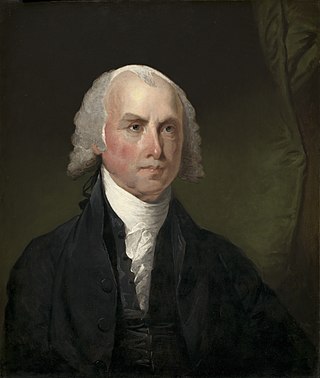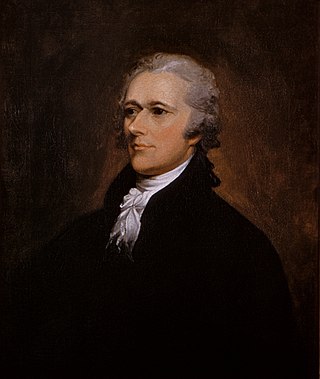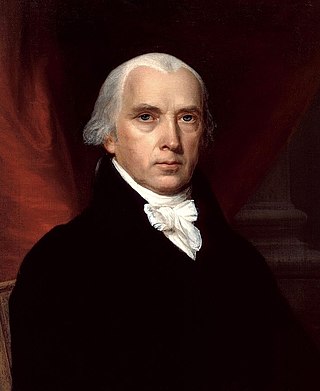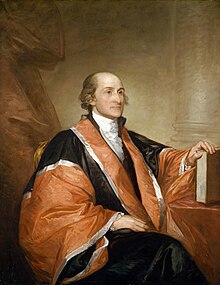
The Federalist Papers is a collection of 85 articles and essays written by Alexander Hamilton, James Madison, and John Jay under the collective pseudonym "Publius" to promote the ratification of the Constitution of the United States. The collection was commonly known as The Federalist until the name The Federalist Papers emerged in the twentieth century.

Anti-Federalism was a late-18th-century political movement that opposed the creation of a stronger U.S. federal government and which later opposed the ratification of the 1787 Constitution. The previous constitution, called the Articles of Confederation and Perpetual Union, gave state governments more authority. Led by Patrick Henry of Virginia, Anti-Federalists worried, among other things, that the position of president, then a novelty, might evolve into a monarchy. Though the Constitution was ratified and supplanted the Articles of Confederation, Anti-Federalist influence helped lead to the passage of the Bill of Rights.
Anti-Federalist Papers is the collective name given to the works written by the Founding Fathers who were opposed to or concerned with the merits of the United States Constitution of 1787. Starting on 25 September 1787 and running through the early 1790s, these Anti-Federalists published a series of essays arguing against the ratification of the new Constitution. They argued against the implementation of a stronger federal government without protections on certain rights. The Anti-Federalist papers failed to halt the ratification of the Constitution but they succeeded in influencing the first assembly of the United States Congress to draft the United States Bill of Rights. These works were authored primarily by anonymous contributors using pseudonyms such as "Brutus" and the "Federal Farmer." Unlike the Federalists, the Anti-Federalists created their works as part of an unorganized group.

In the United States, federalism is the constitutional division of power between U.S. state governments and the federal government of the United States. Since the founding of the country, and particularly with the end of the American Civil War, power shifted away from the states and toward the national government. The progression of federalism includes dual, cooperative, and new federalism.

Federalist No. 2, titled "Concerning Dangers From Foreign Force and Influence", is a political essay written by John Jay. It was the second of The Federalist Papers, a series of 85 essays arguing for the ratification of the United States Constitution. The essay was first published in The Independent Journal on October 31, 1787, under the pseudonym Publius, the name under which all The Federalist Papers were published. Federalist No. 2 established the premise of nationhood that would persist through the series, addressing the issue of political union.

Federalist No. 4, titled "The Same Subject Continued: Concerning Dangers from Foreign Force and Influence", is a political essay by John Jay and the fourth of The Federalist Papers. It was first published in The Independent Journal on November 7, 1787, under the pseudonym Publius, the name under which all The Federalist Papers were published. It is the third of four essays by Jay discussing the protection of the United States from dangerous foreign influence and military conflict. It directly continued the argument made in Federalist No. 3, and it was further continued in Federalist No. 5.

Federalist No. 3, titled "The Same Subject Continued: Concerning Dangers from Foreign Force and Influence", is a political essay by John Jay, the third of The Federalist Papers. It was first published in The Independent Journal on November 3, 1787, under the pseudonym Publius, the name under which all The Federalist papers were published. It is the second of four essays by Jay on the benefits of political union in protecting Americans against foreign adversaries, preceded by Federalist No. 2 and followed by Federalist No. 4 and Federalist No. 5.

Federalist No. 14 is an essay by James Madison titled "Objections to the Proposed Constitution From Extent of Territory Answered". This essay is the fourteenth of The Federalist Papers. It was first published in The New York Packet on November 30, 1787 under the pseudonym Publius, the name under which all The Federalist papers were published. It addresses a major objection of the Anti-Federalists to the proposed United States Constitution: that the sheer size of the United States would make it impossible to govern justly as a single country. Madison touched on this issue in Federalist No. 10 and returns to it in this essay.

Federalist Paper No. 29 is an essay by Alexander Hamilton, the twenty-ninth of The Federalist Papers. It was first published in The Independent Journal on January 9, 1788 under the pseudonym Publius, the name under which all The Federalist papers were published. It is titled "Concerning the Militia". Unlike the rest of the Federalist Papers, which were published more or less in order, No. 29 did not appear until after Federalist No. 36.

Federalist No. 52, an essay by James Madison or Alexander Hamilton, is the fifty-second essay out of eighty-five making up The Federalist Papers, a collection of essays written during the Constitution's ratification process, most of them written either by Hamilton or Madison. It was published in the New York Packet on February 8, 1788, with the pseudonym Publius, under which all The Federalist papers were published. This essay is the first of two examining the structure of the United States House of Representatives under the proposed United States Constitution. It is titled The House of Representatives".

Federalist No. 66 is an essay by Alexander Hamilton, the sixty-sixth of The Federalist Papers. It was published on March 8, 1788, under the pseudonym Publius, the name under which all The Federalist papers were published. The title is "Objections to the Power of the Senate To Set as a Court for Impeachments Further Considered".

Federalist No. 67 is an essay by Alexander Hamilton, the sixty-seventh of The Federalist Papers. This essay's title is "The Executive Department" and begins a series of eleven separate papers discussing the powers and limitations of that branch. Federalist No. 67 was published under the pseudonym Publius, like the rest of the Federalist Papers. It was published in the New York Packet on Tuesday, March 11, 1788.

Federalist No. 68 is the 68th essay of The Federalist Papers, and was published on March 12, 1788. It was probably written by Alexander Hamilton under the pseudonym "Publius", the name under which all of the Federalist Papers were published. Since all of them were written under this pseudonym, who wrote what cannot be verified with certainty. Titled "The Mode of Electing the President", No. 68 describes a perspective on the process of selecting the chief executive of the United States. In this essay, the author sought to convince the people of New York of the merits of the proposed constitution. Number 68 is the second in a series of 11 essays discussing the powers and limitations of the executive branch and the only one to describe the method of selecting the president.

Federalist No. 69 is an essay by Alexander Hamilton, the sixty-ninth of The Federalist Papers. It was published on March 14, 1788 under the pseudonym Publius, under which all The Federalist papers were published. The title is "The Real Character of the Executive", and is the third in a series of 11 essays discussing the powers and limitations of the Executive branch in response to the Anti-Federalist Papers, and in comparison to the King of Great Britain's powers.

Federalist No. 70, titled "The Executive Department Further Considered", is an essay written by Alexander Hamilton arguing for a single, robust executive provided for in the United States Constitution. It was originally published on March 15, 1788, in The New York Packet under the pseudonym Publius as part of The Federalist Papers and as the fourth in Hamilton's series of eleven essays discussing executive power.

Federalist No. 75 is an essay by Alexander Hamilton and seventy-fifth in the series of The Federalist Papers. It was published on March 26, 1788 under the pseudonym Publius, the name under which all The Federalist papers were published. Its title is "The Treaty Making Power of the Executive", and it is the ninth in a series of 11 essays discussing the powers and limitations of the Executive branch.

Federalist No. 76, written by Alexander Hamilton, was published on April 1, 1788. The Federalist Papers are a series of eighty-five essays written to urge the ratification of the United States Constitution. These letters were written by Alexander Hamilton, James Madison, and John Jay under the name of Publius in the late 1780s. This paper discusses the arrangement of the power of appointment and the system of checks and balances. The title is "The Appointing Power of the Executive", and is the tenth in a series of 11 essays discussing the powers and limitations of the Executive branch. There are three options for entrusting power: a single individual, a select congregation, or an individual with the unanimity of the assembly. Hamilton supported bestowing the president with the nominating power but the ratifying power would be granted to the senate in order to have a process with the least bias.

Federalist No. 77 is an essay by Alexander Hamilton, the seventy-seventh of The Federalist Papers. It was published on April 2, 1788, under the pseudonym Publius, the name under which all The Federalist papers were published. The title is "The Appointing Power Continued and Other Powers of the Executive Considered", and it is the last in a series of 11 essays discussing the powers and limitations of the Executive Branch.
The Treaty Clause of the United States Constitution establishes the procedure for ratifying international agreements. It empowers the President as the primary negotiator of agreements between the United States and other countries, and holds that the advice and consent of a two-thirds supermajority of the Senate renders a treaty binding with the force of federal law.

James Madison was an American statesman, diplomat, and Founding Father who served as the 4th president of the United States from 1809 to 1817. He is hailed as the "Father of the Constitution" for his pivotal role in drafting and promoting the Constitution of the United States and the Bill of Rights. Disillusioned by the weak national government established by the Articles of Confederation, he helped organize the Constitutional Convention, which produced a new constitution. Madison's Virginia Plan served as the basis for the Constitutional Convention's deliberations, and he was one of the most influential individuals at the convention. He became one of the leaders in the movement to ratify the Constitution, and he joined with Alexander Hamilton and John Jay in writing The Federalist Papers, a series of pro-ratification essays that was one of the most influential works of political science in American history.








